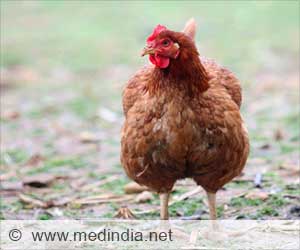Researchers have developed in the lab a vaccine that is potent against one antigenic variant of the avian influenza virus H5N1 that has ability to protect humans against future variants/mutants
As a breather and news that spells heaven for millions of avian influenza patients there is a research by scientists at St. Jude Children’s Research Hospital . According to them they have developed in the lab a vaccine that is potent against one antigenic variant of the avian influenza virus H5N1. The scientific discovery is that this vaccine also has the ability to protect humans against future variants/mutants of the virus.
The great thing about such vaccines is that these can be used as stockpiles of medicine and used as and when required. This would save time and many lives unless new vaccines can be found against those variants.A prepublication report on the study appears in the online issue of Journal of Infectious Diseases (JID).
The researchers showed that the vaccine completely protected ferrets from a lethal nasal infection against not only the original virus the vaccine was made to thwart, but also against a newer variant that has already proved fatal to humans. The ferrets experienced a more significant reduction of virus multiplication than otherwise would have occurred, the researchers reported. Moreover, the infections failed to spread out of the upper respiratory tract to the lungs or brain.
“These findings are especially significant because ferrets are known to be an excellent and accurate model of influenza infection and immune response in humans,” said Elena Govorkova, Ph.D., a staff scientist in the Department of Infectious Diseases at St. Jude. “Restricting the infection to the upper respiratory tract is important since in humans the virus has been isolated from specimens taken from the cerebrospinal fluid, feces, throat and blood serum. Therefore, limiting the spread of virus in an infected human is crucial to saving that person’s life.” Govorkova is the lead author of the JID paper and led the research team conducting the study.
The team also showed that the optimal strategy for vaccination of immunologically naïve individuals will be the use of two doses, which in the ferrets triggered more antibody protection than a single dose. Immunologically naïve individuals are those whose immune systems have not been stimulated to respond to a particular antigen.
The St. Jude study was the first one to show cross-reactive immunity against current H5N1 variants in ferrets, according to Robert Webster, Ph.D., a member of the Infectious Diseases department and holder of the Rose Marie Thomas Chair at St. Jude. Webster is an internationally renowned expert on avian influenza viruses and is senior author of the report in JID.
Advertisement
Using reverse genetics, the team mixed genes from a safe, laboratory bird flu virus with a gene for the hemagglutinin (HA) protein from the H5N1 virus isolated in Hong Kong. The virus uses the HA proteins on its surface to infect cells in the respiratory tract. The resulting vaccine had the outside appearance of a dangerous virus that would stimulate the immune system, but the inside genes of a harmless variety of virus that could not cause disease. The St. Jude team was the first to use reverse genetics to make a vaccine against H5N1 that moved out of the laboratory and into clinical trials.
Advertisement






